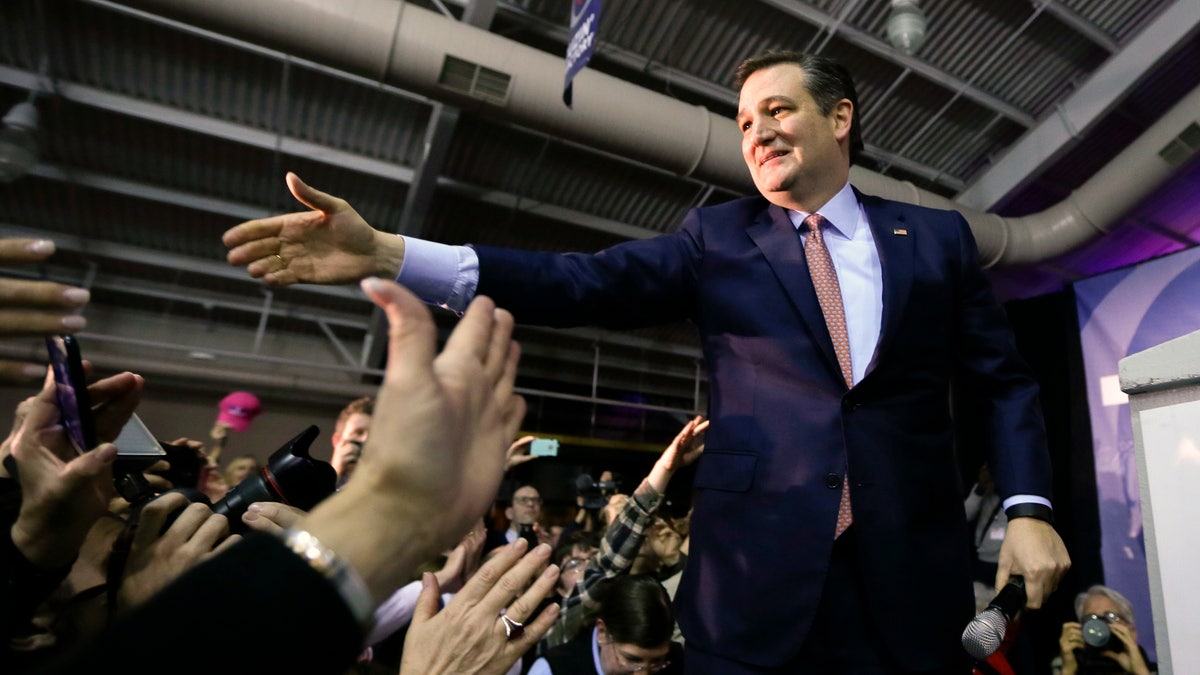
Republican presidential candidate, Sen. Ted Cruz, R-Texas, greets supporters during a caucus night rally, Monday, Feb. 1, 2016, in Des Moines, Iowa. Cruz sealed a victory in the Republican Iowa caucuses, winning on the strength of his relentless campaigning and support from his party's diehard conservatives. (AP Photo/Charlie Neibergall)
Ted Cruz has made Latino history. By winning the GOP caucus in Iowa, the Texas Senator has become the first Latino candidate to win a major party caucus in a state that is not their own. The irony of Cruz's Latino milestone is, of course, that he does not think of himself as Latino.
But Iowa, last night, was good to more than one Latino. By coming in a close third, and by dint of being the last establishment friendly Republican standing, Senator Marco Rubio of Texas, has also placed himself in the position of being able to win primaries further down the line, and join Cruz as a Hispanic trailblazer. Unlike Cruz, Rubio does identify himself as Hispanic, and as a proud heir to the great American immigrant dream.
Cruz, and Rubio too, have come further than any Latino politician has before them. They form part of a great Hispanic political tradition which, despite growing numbers nationwide, has heretofore struggled to make a mark on the national political scene. Previous to Senator Cruz, the Hispanic politician who had gone the furthest in Iowa had been Bill Richardson, former Democratic Governor of New Mexico. Richardson came in a distant fourth in the same caucus season that saw now-President Barack Obama top John Edwards and Hillary Clinton.
The fact that Cruz, Hispanic trailblazer, is a Republican is yet another of the surprising aspects of the current electoral season. According to the Pew Research Center, almost 6 of every 10 eligible Latino voters in the country identify themselves as Democrats [1] and not Republicans. This number has been growing in recent years, as the immigration debate has grown increasingly acrimonious within the Republican Party.
And yet, two of the GOP’s rising political stars on the national stage are Hispanic while, on the Democratic side, which one might expect to be overflowing with Hispanic talent, Richardson was the last Latino politician to have any sort of national footprint.
Beyond their considerable personal skills as politicians and candidates, Cruz and Rubio have benefited from the anti-establishment revolution that has swept through the Republican Party. Both Senators form part of that upstart generation that rose with the Conservative Tea Party grassroots movement. Both cut their political reputation taking on, and beating, GOP bigwigs.
Perhaps, when the Democratic Party turns to a new generation of political leadership, there will be Latinos among those who take on, and defeat, the establishment of the party. If and when that happens, regardless of the political and ideological differences of their positions, they will be following in the footsteps of Ted Cruz.
And that too will be deeply ironic.
